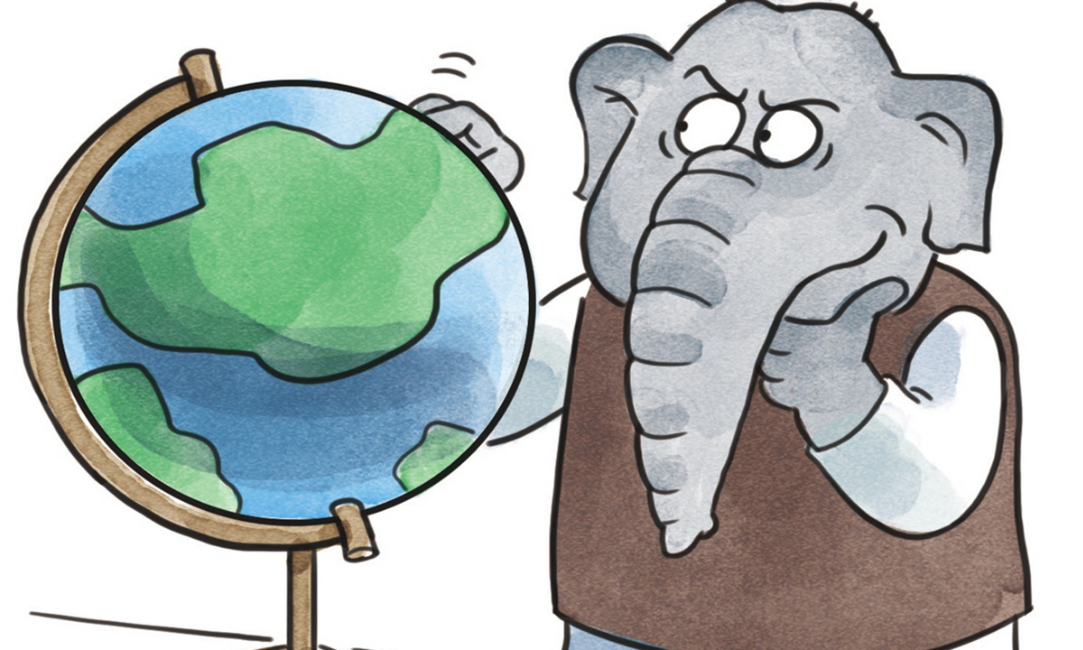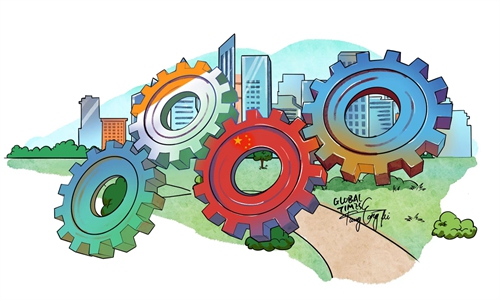
India Illustration: Liu Rui/GT
India officially assumes the rotating presidency of the Group of 20 (G20) on December 1. Indian Prime Minister Narendra Modi previously said in his closing remarks at the G20 Summit in Bali, Indonesia, that it is a matter of pride for every Indian as the country takes over the presidency.
Since Modi came into power, India has gradually downplayed its non-alignment diplomacy, while turning into a leading power diplomacy. Compared with the non-alignment diplomacy advocated by the Indian National Congress (INC), the leading power diplomacy promoted by the Bharatiya Janata Party (BJP) and the Modi administration has brought subtle changes to India's strategic orientation.
First, India is more proactive in diplomacy. When the INC was in power, India's diplomacy was generally defensive. In contrast, the BJP, which represents Hindu nationalism, is more proactive in the diplomatic field. The BJP has downplayed India's role of the leader of the Non-Aligned Movement and its role as a developing country. It regards the role of a major power as India's diplomatic background, advocates being on an equal footing with world powers and expands India's interests worldwide. It is more proactive and independent.
Second, the US and Western elements are on the rise in India's diplomacy. Non-alignment diplomacy focuses on India's positioning as a leader of developing countries. It advocates jointly rising with China strategically and together handling the challenges posed by the West. This kept US-India relations sluggish, and the US used to have a limited role in China-India relations. But since the BJP came into power, it is more eager to realize India's dream as a major power, and it has a strong motivation to turn to a leading power diplomacy.
To achieve the status of a major power diplomatically, the BJP believes India should first break the geopolitical identity shackle of an Asia-Pacific country. By taking advantage of Washington's Indo-Pacific Strategy, India starts to play the US card. For New Delhi, it is clear that the US cannot realize its goal in Indo-Pacific Strategy without India's cooperation. This not only increases India's importance, but also boosts India's strategic leverage and enhances its initiative in foreign relations. The raging COVID-19 pandemic and the Russia-Ukraine conflict have accelerated India's adjustment in its diplomatic strategy. New Delhi believes that the needs of the US and the West for itself are increasing. Washington has increased the significance of Quad and launched the Indo-Pacific Economic Framework, which has also strengthened India's belief in this regard.
Besides, security factors are increasingly prominent in economic and trade cooperation. Leading power diplomacy requires economic size and strength that can match India's status. For this reason, the Modi administration has proposed many initiatives such as "Make in India," aiming at seizing the opportunities in the process of the reshaping of global economic structure and at leading India to become a new manufacturing base in the world and a global economic power.
Thus, on the one hand, India is attracting Western multinational companies to transfer production capacity from China to India, on the other hand, India is generalizing the security factor in China-India economic and trade cooperation. Indeed, China-India relations are gradually restoring, but the security factor's impact on the two countries' economic and trade cooperation also cannot be ignored.
Last but not least, India needs stable relations with China for the sake of its development. Although there have been some other factors in India's economic and trade cooperation with China, the total trade volume between China and India reached a record high in 2021, which shows there is a huge potential for cooperation in the two countries' industrial structure. India believes that it is at the critical point of an economic take-off and it is capable of achieving medium-to-high growth in the next 20 to 30 years. This requires India to first maintain a peaceful and stable economic development environment. If China-India relationship is full of confrontation, friction and conflict, it is not conducive to India's development. The diplomatic and military communication between China and India has not stopped, and India is also constantly thinking about how to create an external environment that benefits its development.
India has used the US' help but it is not to become the US' strategic vassal. It aims at realizing its own strategic interests. Leaning too much on the US is not what India wants. Therefore, maintaining stable relations with China is one of the main aspects of India's leading power diplomacy. With the rise of the two countries, their interests will be increasingly intertwined. Managing relations with China is an important prerequisite for India to realize its dream of a major power. As two major developing countries, China and India are working to maintain their relations in a mature and wise manner.
The author is former correspondent of the Global Times in India. opinion@globaltimes.com.cn

